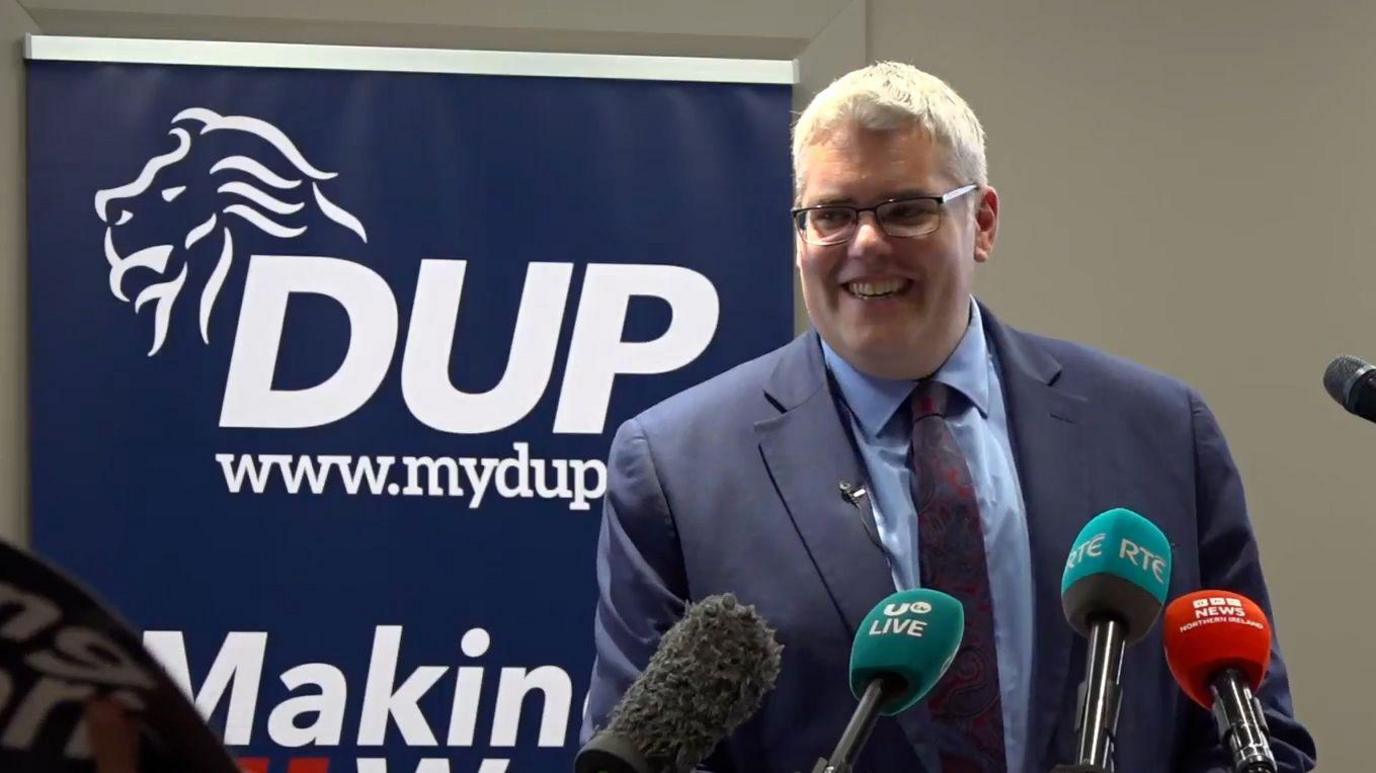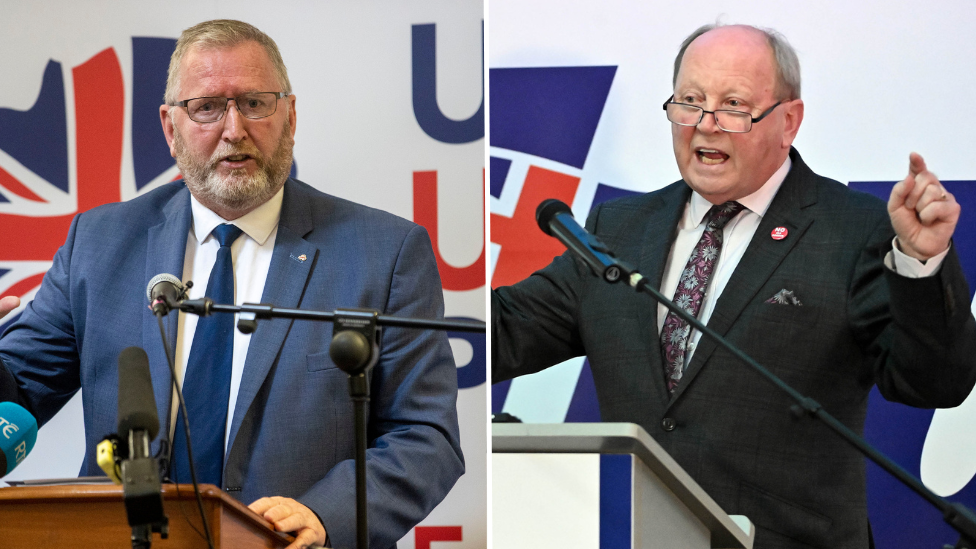DUP leader accepts party oversold Stormont deal

Gavin Robinson was ratified as DUP leader on Wednesday evening
- Published
Democratic Unionist Party (DUP) leader Gavin Robinson has accepted his party oversold the deal to restore power sharing in Northern Ireland.
Mr Robinson had been accused of backtracking on the deal he helped negotiate to restore power sharing.
It followed a speech on Wednesday where Mr Robinson appeared to contradict previous messages delivered by the DUP leadership.
He was speaking after being ratified as the DUP party leader.
He told party members that, despite the deal negotiated with the government, the Irish Sea border remained in place.
This was at odds with previous statements made by the former leader Sir Jeffrey Donaldson, who insisted the Irish Sea border had been “effectively” removed as a result of the Safeguarding the Union deal he secured with the government.
When pressed about whether the DUP had oversold the deal, Mr Robinson told BBC Radio Ulster's The Nolan Show on Thursday: “Yes, there should have been more cautious realism."
What did Gavin Robinson tell DUP party officers?
On Wednesday evening, Mr Robinson addressed his party executive in Lisburn, after it was confirmed he would lead the DUP into the election.
He was appointed interim leader by party officers in March after Sir Jeffrey Donaldson resigned.
His resignation came after he was charged with rape and other historical sex offences, which Sir Jeffrey has said he will contest.
Mr Robinson said he was looking forward to leading his DUP team into the election with "energy and purpose".
He addressed Northern Ireland’s place in the union, following arrangements agreed by the DUP and the government aimed at addressing the Irish Sea border.
He said the party would send a clear message to the next government - whether Labour or Conservative - that there was still work to do to improve those new arrangements.
“We will continue to fight to fully restore Northern Ireland’s place within the United Kingdom, including removing the application of EU law in our country and the internal Irish Sea Border it creates."
He said he was urging all unionist voters to set aside “internal debate” in the aim of maximising unionist representation at Westminster.
How have other unionists reacted?

Doug Beattie and Jim Allister have accused Mr Robinson of backtracking
The Ulster Unionist Party (UUP) has accused the DUP leader of changing the party's previous position on the effectiveness of the Safeguarding the Union deal.
"We're talking about a huge backslide here in many ways," UUP leader Doug Beattie told the BBC's Nolan Show.
Mr Beattie recalled that when the deal was published in January, the UUP was "clear it did not remove the Irish Sea border".
He added that the UUP and the Traditional Unionist Voice (TUV) leader Jim Allister "don't agree on tactics but we were absolutely clear on that - that it [the DUP's deal] did not do what they said it did".
Mr Beattie claimed that the upcoming General Election was the only reason that the DUP was revisiting the issue now.
"If the election was in November we would be carrying on with this falsehood that EU law had been negated and the Irish Sea border had gone," he said.
'Reverse gear'
Mr Allister told BBC News NI that the DUP leader's words showed his TUV party was right about the deal "all along".
"I think the fact that the DUP has had to find reverse gear on their own spin raises a fundamental issue of trust," Mr Allister said.
"The DUP told us that under their deal - a deal which is indelibly marked with the fingerprints of Gavin Robinson - they told us the Irish Sea border was gone, EU law was blocked, our place had been restored in the United Kingdom.
"We said none of that was true and now they've had to backtrack to confirm what we said all along.
"Now that does raise a fundamental issue of trust between the DUP and the electorate," the TUV leader insisted.
Analysis: Big reset - but big questions remain
It was a reset in all but name as Gavin Robinson sought to heal rifts within the DUP ahead of next months election.
He acknowledged in a coded way that the deal he negotiated to restore power sharing was oversold at the time.
There should have been more “cautious realism” around what was achievable at the time, he said.
He also fully accepted the Irish Sea border remains in place despite what the leadership had previously claimed.
It was enough for one key critic who said the party had now adopted a “more honest” position on the Irish Sea border.
But how does the DUP now plan to get the border removed?
That remains the big question, which will likely remain unanswered this side of the election.
DUP stand aside in Fermanagh and South Tyrone
- Published29 May 2024
Gavin Robinson appointed interim leader of DUP
- Published29 March 2024
What is the new Northern Ireland Brexit trade deal?
- Published2 February 2024